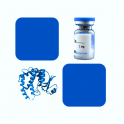
- Remove this product from my favorite's list.
- Add this product to my list of favorites.
Products
Viewed products
Newsletter
 |  |  |  |  |  |

Background
ApoA1 is also known as apolipoprotein A-I, ApoA-I , and is the major protein component of high density lipoprotein (HDL) in plasma. It has a specific role in lipid metabolism. Chylomicrons secreted from the intestinal enterocyte also contain ApoA1 but it is quickly transferred to HDL in the bloodstream. The protein promotes cholesterol efflux from tissues to the liver for excretion. It is a cofactor for lecithin cholesterolacyltransferase (LCAT) which is responsible for the formation of most plasma cholesteryl esters. ApoA-I was also isolated as a prostacyclin (PGI2) stabilizing factor, and thus may have an anticlotting effect. Defects in the gene encoding it are associated with HDL deficiencies, including Tangier disease, and with systemic non-neuropathic amyloidosis. In addition, it has been shown that ApoA1 is implicated in the anti-endotoxin function of HDL via interaction with lipopolysaccharide or endotoxin.
Source
Recombinant Human Apo-A1 Protein (Human Apo-A1, His Tag), His Tag (AP1-H5225) is expressed from human 293 cells (HEK293). It contains AA Arg 19 - Gln 267 (Accession # NP_000030.1).
Predicted N-terminus: Arg 19
Molecular Characterization
This protein carries a polyhistidine tag at the C-terminus.
The protein has a calculated MW of 29.8 kDa. The protein migrates as 27 kDa under reducing (R) condition (SDS-PAGE).
Endotoxin
Less than 1.0 EU per μg by the LAL method.
Purity
>95% as determined by SDS-PAGE.
Formulation
Lyophilized from 0.22 μm filtered solution in PBS, pH7.4. Normally trehalose is added as protectant before lyophilization.
Reconstitution
Please see Certificate of Analysis for specific instructions.
For best performance, we strongly recommend you to follow the reconstitution protocol provided in the CoA.
Storage
For long term storage, the product should be stored at lyophilized state at -20°C or lower.
Please avoid repeated freeze-thaw cycles.
This product is stable after storage at:
-20°C to -70°C for 12 months in lyophilized state;
-70°C for 3 months under sterile conditions after reconstitution.
Bioactivity
n/a
(1) "APOLIPOPROTEIN E GENE POLYMORPHISMS AND PLASMA LIPIDS IN PERSONS LIVING WITH HIV: A CROSS SECTIONAL STUDY"
Kuti, Bamidele, Nduka et al
Ann Ib Postgrad Med (2024) 22 (1), 8-13
(2) "The indicative effects of apolipoproteins on organic erectile dysfunction: bridging Mendelian randomization and case-control study"
Zhang, Yan, Li et al
Front Endocrinol (Lausanne) (2024) 15, 1359015
(3) "The association of the apolipoprotein B/A1 ratio and the metabolic syndrome in children and adolescents: a systematic review and meta-analysis"
Dinpanah, Kazemi, Shetty et al
J Diabetes Metab Disord (2024) 23 (1), 1-10
Showing 1-3 of 13883 papers.
Follow us